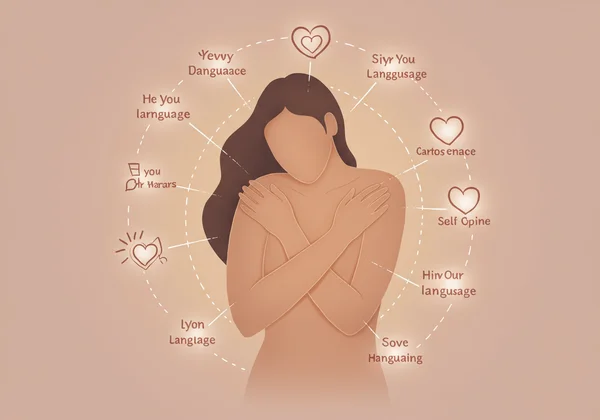Find Your Self-Love Language: Take the Free Love Language Test for Self-Care
October 8, 2025 | By Hannah Carter
The relationship you have with yourself is the most important one you'll ever nurture. It sets the foundation for how you connect with others and navigate the world. But in the rush of daily life, we often forget to ask a fundamental question: What is my love language when it comes to self-care? Just as we express and receive love in relationships, we also have unique ways of showing kindness and support to ourselves. Applying the concept of the five love languages to your own well-being can transform your self-care routine from a chore into a deeply fulfilling practice. Many people start this journey with a 5 love languages quiz to gain instant clarity. Ready to understand your emotional needs better? You can start your discovery with a simple quiz.

Understanding Your Self-Love Language: What Are Your Core Needs?
Before you can build a meaningful self-care practice, you need to understand the "language" your inner self speaks. It’s about identifying what truly recharges and validates you on an emotional level. When your actions align with your primary self-love language, you feel seen, understood, and cared for by the most important person in your life: you. This isn't just about feeling good; it's about building a resilient and compassionate relationship with yourself that can weather any storm.
The 5 Love Languages: A Refresher for Personal Discovery
The renowned theory by Dr. Gary Chapman outlines five core ways people give and receive love. Let’s briefly revisit them through the lens of self-love:
- Words of Affirmation: This language focuses on using words to uplift and encourage.
- Quality Time: This is about giving your undivided, focused attention.
- Receiving Gifts: This language centers on tangible symbols of love and appreciation.
- Acts of Service: This is about actions that ease responsibility and offer support.
- Physical Touch: This language involves physical connection to feel safe and loved.
Each of these provides a powerful framework for personal discovery and self-nurturing.
Identifying Your Primary Self-Love Language
How do you find your primary self-love language? You can start by reflecting on past moments. When did you feel most proud of yourself or deeply content? What actions made you feel restored and valued? While reflection is a great start, taking a free love language test provides a structured way to gain clarity. The love language quiz is an excellent tool designed to reveal your preferences quickly and accurately by analyzing how you instinctively respond to different emotional cues.

How to Practice Self-Love Using Your Unique Language
Once you have an idea of your primary self-love language, you can begin to how to practice self-love in a way that truly resonates. It’s about moving beyond generic advice and creating a personalized routine that fills your unique emotional cup. Here’s how you can apply each language to your daily life.

Words of Affirmation: Nurturing Your Inner Dialogue with Kindness
If your self-love language is Words of Affirmation, your inner critic might be your biggest obstacle. The goal is to replace self-criticism with encouragement. Your power lies in self-affirmation techniques. Start your day by looking in the mirror and saying something kind to yourself. Keep a journal to celebrate small wins and write down compliments you receive. Surround your workspace with sticky notes bearing positive messages. You are what you tell yourself you are.
Quality Time: Prioritizing Your Presence and Inner Reflection
For those who thrive on Quality Time, being present with yourself is the ultimate act of love. This means putting away your phone, silencing notifications, and engaging in mindful self-care activities. Schedule a solo date to a museum, a park, or your favorite coffee shop. Dedicate 15 minutes to meditation or simply sitting in silence. Lose yourself in a hobby you love, whether it's painting, reading, or gardening. The key is to give yourself your undivided, intentional attention.
Receiving Gifts: Acknowledging Your Worth with Thoughtful Self-Treats
Receiving Gifts as a self-love language is not about materialism; it's about rewarding yourself with tangible symbols of your worth and effort. It's a physical reminder that you deserve good things. Buy that book you’ve been eyeing after a tough week. Invest in a cozy blanket that makes you feel comforted. Treat yourself to fresh flowers to brighten your space. These gifts are powerful affirmations of self-worth that you can see and touch.
Acts of Service: Supporting Yourself with Empowering Actions
If Acts of Service is your language, you feel most loved when someone makes your life easier. Applying this to yourself means taking proactive steps to reduce your own future stress. These self-care tasks are gifts to your future self. Meal prep for the week ahead, declutter your closet, or set up automatic bill payments. Finishing a task you've been procrastinating is a profound act of self-love that brings a deep sense of peace and accomplishment. Start by finding your results to see if this is your primary need.
Physical Touch: Connecting with Your Body and Senses
For those whose language is Physical Touch, feeling connected to your body is essential for well-being. This language is about comfort, safety, and grounding. Practice self-soothing touch through a warm bath with essential oils, a dedicated skincare routine where you gently massage your face, or stretching your body after a long day. Wrapping yourself in a soft robe or weighted blanket can also provide immense comfort. It's about honoring your body as your home.
Cultivating Your "Self-Care Ideas" and Building Resilience
Understanding your self-love language is the first step. The next is to integrate this knowledge into a sustainable practice. Your self-care ideas should become part of a resilient routine that supports you through good times and bad. This is the heart of your personal self-love journey.
Designing Your Personalized Self-Care Routine
A successful self-care plan is one you can stick with. Start small. Choose one or two activities that align with your primary love language and schedule them into your week, just as you would any other important appointment. For example, if your language is Quality Time, block out 30 minutes every evening for reading. If it's Words of Affirmation, set a daily phone reminder with a positive message. Consistency is more powerful than intensity.
Overcoming Internal Blocks on Your Self-Love Journey
It's common to face internal resistance, such as guilt or feelings of unworthiness, when you start prioritizing self-care. Acknowledging these feelings is the first step to overcoming them. Practice self-compassion challenges by gently reminding yourself that you are worthy of care and kindness. If you struggle, start with the smallest possible action. True self-worth improvement comes from repeatedly showing up for yourself, proving through your actions that you matter.

Embarking on Your Continuous Self-Love Journey
Discovering and practicing your self-love language is not a one-time event; it's a continuous, beautiful journey of self-discovery and compassion. By understanding what truly makes you feel loved and valued, you can build a deeper, more resilient relationship with yourself. This foundation of self-love will positively impact every other area of your life, from your relationships to your personal goals.
Are you ready to stop guessing what you need and start giving yourself the love you truly deserve? The first step is clarity. Take the free love language test today to unlock a deeper understanding of yourself and begin your most important journey.
Frequently Asked Questions About Your Self-Love Language
How do I find my primary self-love language?
Reflecting on what makes you feel most cared for is a great start. However, the quickest and most insightful way to identify your primary language is by taking an intuitive quiz. The free 5 love languages quiz is designed to help you uncover your core needs by presenting you with real-life scenarios, providing a clear and actionable result.
Can my self-love language change over time?
Yes, it certainly can. While you may have a dominant language that remains consistent, your preferences can shift based on life experiences, stress levels, or personal growth. It's healthy to check in with yourself periodically. Re-taking the love language test every year or so can be a wonderful way to honor your evolution and adjust your self-care practices accordingly.
What if I appreciate all five self-love languages?
That's completely normal and healthy! Appreciating all five languages means you have a well-rounded ability to give and receive love in various forms. However, most people still have one or two primary languages that resonate more deeply and recharge them most effectively. The goal of the love language test isn't to limit you, but to help you focus your energy where it will have the greatest impact on your well-being.